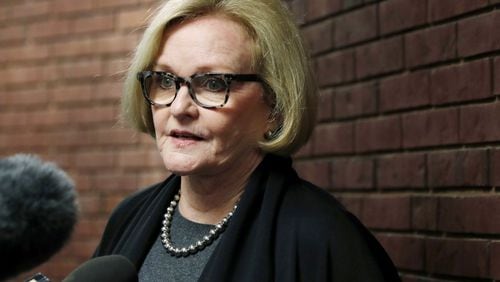Missouri Sen. Claire McCaskill made several bold statements during dozens of town hall meetings in August but one claim, about paid maternity leave, caught our attention.
Last year, PolitiFact rated a similar statement by New York Sen. Kirsten Gillibrand as Mostly True, but a lot can change in year. So we decided McCaskill’s statement was worth a follow-up.
The most frequently used measure of determining a developed country is the Organization for Economic Cooperation and Development (OECD), according to University of Missouri Associate law professor Sam Halabi.
The United States became an OECD member in 1961, and is now one of 35 member countries. As of 2016, the United States had the third-highest gross domestic product (GDP) per capita in the world.
Sarah Feldman, a spokesperson for McCaskill, cited last year’s fact-check on Gillibrand as support for McCaskill’s statement.
“Senator McCaskill and Senator Gillibrand made the same statement, with a few small differences: ‘industrial’ vs. ‘developed’ and ‘paid family leave’ vs. ‘paid maternity leave,’” Feldman said. “Maternity leave is a subset of paid family leave, so if a country has paid family leave it would have maternity leave as well.”
The United States ranks dead last in a study conducted by the OECD on the national paid maternity-leave policies of its member countries. Mexico comes in second-to-last place. The average amount of paid leave time for mothers was a little over one year, as of 2016.
Though some U.S. companies provide paid maternity leave for employees, like Etsy, Ikea and Twitter, there is no national mandate.
The Family and Medical Leave Act requires that mothers have a minimum of 12 weeks of unpaid maternity leave. California, Rhode Island and New Jersey are the only states with paid maternity leave mandates, and New York will join them beginning in 2018. But California and New Jersey only require six weeks of partial income replacement, and Rhode Island only requires four weeks of 60 percent income replacement. That’s nowhere near what some countries require employers to provide.
Jessica Ciccone, St. Louis University School of Law director of communications, cited an International Labour Organization study, which found Papua New Guinea and the United States are the only two of the 185 countries and territories reported in the study that do not provide paid maternity leave.
Papua New Guinea is not considered an industrialized nation.
Our ruling
Based on OECD and ILO data, the United States is the only industrialized nation without paid maternity leave. Yet some nations with paid maternity leave exclude certain groups of workers, meaning it isn’t quite universal. In the same sense, the United States has some states that do mandate paid maternity leave, and parents can take unpaid time off after a child is born or adopted, although there isn’t a national law.
We rate this statement Mostly True.
“We’re the only developed nation in the world that doesn’t have paid maternity leave.”
— Sen. Claire McCaskill, D-Mo., on Tuesday, Aug. 22, 2017 in a town hall meeting in Monett, Mo.






